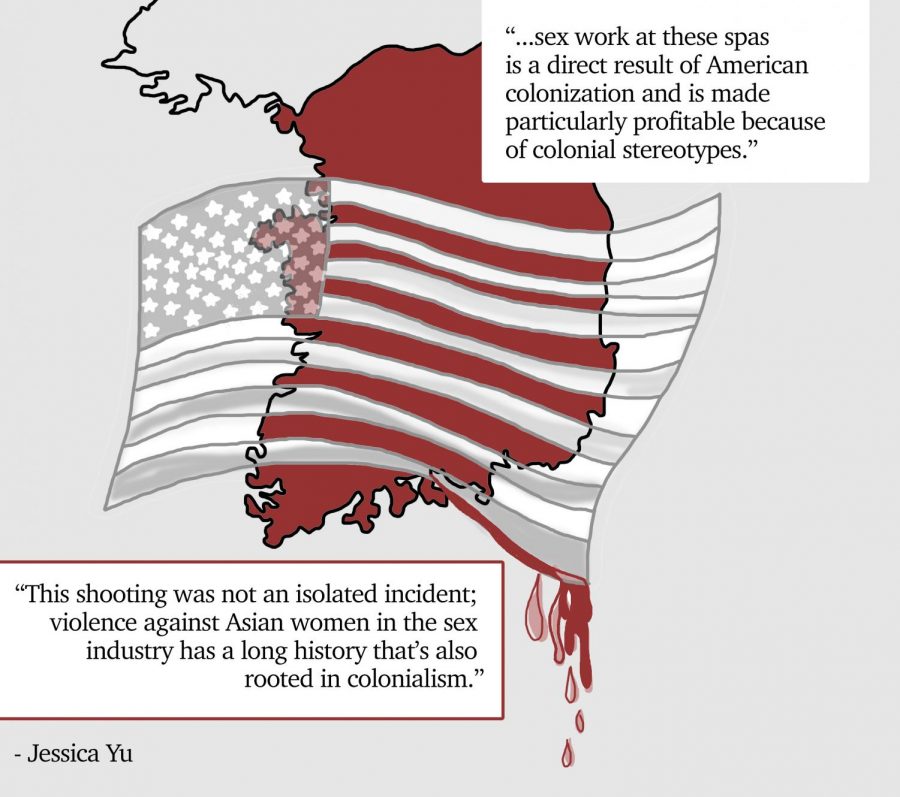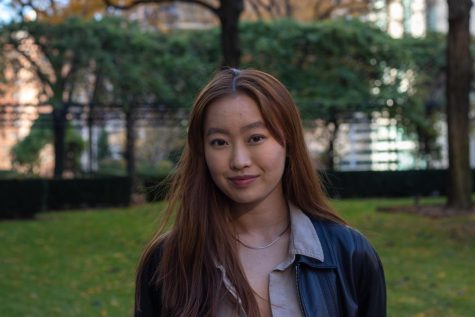American Men Have Been Taught to Fetishize Asian Women
The Atlanta shootings are a direct result of American colonialism
March 25, 2021
 On March 16, 2021, a man committed a hate crime and killed eight people, six of whom were Asian women, in three massage parlors in Atlanta, Georgia. The names of the eight victims are as follows: Soon Chung Park, Hyun Jung Grant, Suncha Kim, Yong Yue, Delaina Ashley Yaun Gonzalez, Paul Andre Michels, Xiaojie Tan and Daoyou Feng.
On March 16, 2021, a man committed a hate crime and killed eight people, six of whom were Asian women, in three massage parlors in Atlanta, Georgia. The names of the eight victims are as follows: Soon Chung Park, Hyun Jung Grant, Suncha Kim, Yong Yue, Delaina Ashley Yaun Gonzalez, Paul Andre Michels, Xiaojie Tan and Daoyou Feng.
Shortly after the hate crime occurred, I shared a post related to the Atlanta shooting on my Instagram story, highlighting that it was a hate crime against sex workers. Someone responded to it, telling me that these massage parlors are often prostitution rings, playing devil’s advocate in a situation that is nothing short of inhumane.
My response to them: So what? Even if they were prostitutes, did they deserve to die?
I question whether half the people using the hashtag have any idea how deeply ingrained anti-Asian discrimination is in United States history.
Were the Victims Sex Workers? Does It Matter?
The fact these massage parlor employees could have been sex workers is not at all a means to justify the shooting. It’s actually a large part of why the shooting occurred. Not only are Asian women seen as part of the “model minority” myth, but we are also perceived as small, dainty, submissive and obedient. We are seen as innocent and even “pure,” which plays into the archaic, evangelically rooted belief that women are more desirable when they are untouched.
Capt. Jay Baker of the county’s police department said in a press conference that the shooter “apparently has an issue, what he considers a sex addiction, and sees these locations as a temptation for him that he wanted to eliminate.”
The shooter was said to frequent these Asian spas as a way to indulge his so-called sex addiction. He does not have to admit to fetishizing Asian women — it is all too obvious and feels all too familiar to those of us who are aware of just how common this fetishization is.
How to Help: What is Actually Going to be Effective?
As a response to the Atlanta shooting, the phrase “Stop Asian Hate” has been circulating on social media and appearing on signs as people take to the streets to protest. Quite frankly, this umbrella term makes me cringe. I question whether half the people using the hashtag have any idea how deeply ingrained anti-Asian discrimination is in United States history.
I’ve read articles compiling lists of ways to help: donate, report hate crimes, volunteer, check in on your Asian friends, support Asian-owned businesses, and educate yourself.
For some reason, “educate” always comes last, if it makes the list at all. Perhaps it’s because everything else, like donating or texting your friends, can be done easily and quickly, but education takes time, effort and discomfort. Donating and texting certainly will make people feel better that they at least did something.
While the Atlanta shooting may have been shocking to some, this did not just happen out of nowhere.
The History of Fetishizing Asian Women
So, I implore you to recognize anti-Asian racism for what it is: systemic. While the Atlanta shooting may have been shocking to some, this did not just happen out of nowhere. The shooter did not simply have a “bad day.” Asian hate crimes have spiked because of COVID-19, but let’s get one thing straight: COVID-19 did not cause Asian hate — it exacerbated a long-existing problem. Racism against Asians has always been here, and so has the hyper-sexualization and fetishization of Asian women.
For starters, let’s focus on how U.S. military presence in South Korea has abused its power over Korean women’s bodies.
Camptowns and Prostitution
Dating back to September 1945, the U.S. military has established military bases in South Korea. This lasted throughout the Korean War and remains a problem today. In the early 2000s, there were an estimated 35,000 U.S. troops situated in South Korea. Today, there are about 28,500 troops.
Where there are troops, there are young Asian women selling their bodies to American soldiers. The areas surrounding U.S. military bases have become known as “camptowns.” All these towns are centers for commercial sex, both in South Korea and at U.S. military bases around the world. These camptowns are made up of the same formula of clubs, bars, liquor stores, drug stores and brothels, and they all contain prostitution.
Camptowns began to flourish after the 1953 Korea-U.S. Mutual Defense Treaty. More of these towns appeared around the country as the United States colonized more of South Korea. Koreans living in these areas were at the complete mercy of American soldiers. As a result, selling sex became an easy way to making a living.
The Reduction of Asian Women to Their Bodies
Toward the end of World War II, Korean local governments became increasingly aware of how American soldiers were taking advantage of local women. Thus, authorities of the U.S. Army Forces in Korea introduced a “hands off Korean women” policy stating that American soldiers were not allowed to form relationships with Korean women unless they were prostitutes.
How do you keep soldiers happy in South Korea? Allow them access to Korean women’s bodies with very little cost or consequence.
The South Korean government knowingly supported this because the U.S. military presence was beneficial to the South Korean economy. How do you keep soldiers happy in South Korea? Allow them access to Korean women’s bodies with very little cost or consequence.
The act of excluding prostitutes is problematic on several levels in that it reduces a sex worker’s humanity, and it introduced a narrative that American men should not view Korean women as people they can have relationships with but as bodies they can use for their own sexual gratification.
The Migration of Camptown Prostitutes: From South Korea to Southern United States
In the 1970s, camptowns experienced instability when there were sudden troop reductions in South Korea. As some of the troops disappeared, so did the jobs for women who were previously reliant on American soldiers for money. As a result, these sex workers eventually found their way to the United States, specifically around military bases in southern states such as Georgia.
So no, the Atlanta shooting is not just one in an unfortunate series of events, but rather an example of how the objectification of Asian women has always and will continue to harm us.
These women worked at or opened massage parlors from which they offered sexual services to American men. So, yes, these massage parlors in the Atlanta shooting may have offered prostitution services. Yes, in 2014, police had arrested several massage parlor employees for prostitution at Gold Spa, one of the businesses the shooter had targeted. But that is only because sex work at these spas is a direct result of American colonization and is made particularly profitable because of colonial stereotypes.
Violence Against Asian Women Is a Pattern
Don’t be fooled. This shooting was not an isolated incident; violence against Asian women in the sex industry has a long history that’s also rooted in colonialism. Back in 1974, when Korean sex workers first arrived in southern military bases, a 25-year-old American soldier attacked two women in Fort Carson, Colorado. The soldier stabbed and slit the throat of Yon Lee. He then raped and murdered Sun Ok Cousin.
So no, the Atlanta shooting is not just one in an unfortunate series of events, but rather an example of how the objectification of Asian women has always and will continue to harm us.
So no, the Atlanta shooting is not just one in an unfortunate series of events, but rather an example of how the objectification of Asian women has always and will continue to harm us. It translates into violence and hate that permeates the history of Asian Americans.
The history of South Korean camptowns, which still exist in abundance today, is just one specific aspect of the anti-Asian racism that we need to educate ourselves on in order to prevent further discrimination against Asian Americans. However, it’s an important focal point in the aftermath of the Atlanta shooting, especially in order to minimize the fetishization and objectification of Asian women.
The media is not going to help you understand how America’s history of interfering with Asian countries is harmful to Asian bodies today, but you can put in the effort to read about it. Learn it. Recognize it. And maybe then, we might finally stand a chance against this violence.
















